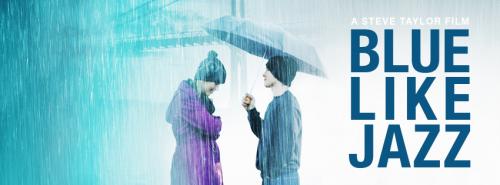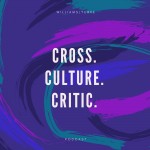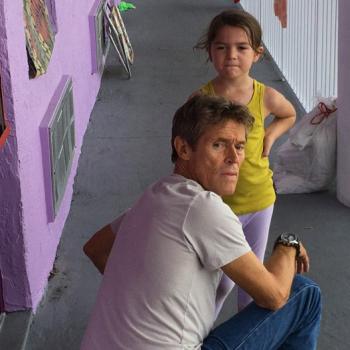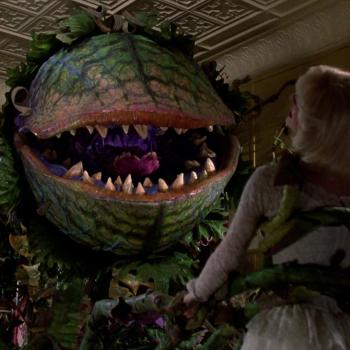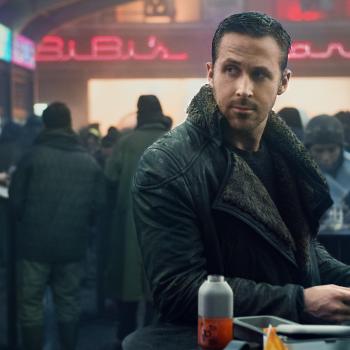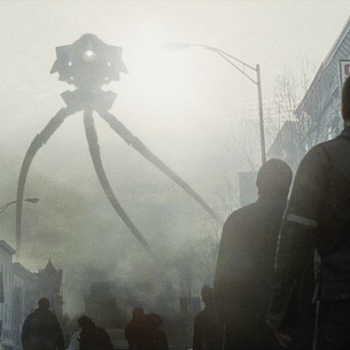Whenever people find out that I’m a Christian and a film critic (but not, I should stress, a Christian film critic), there’s one movie they always ask me about. Depending on their background and leanings, they either expect that I love it or want to know why it’s so terrible.
That movie is “God’s Not Dead.” I’ve had friends ask me if I like it, reporters ask me why it’s so bad and I’ve talked about it on podcasts. The most popular thing I’ve written was a pan of the film.
And honestly, I’m tired of being asked about it. It’s not a good film. It’s a bad film, and one that I’ve said is dangerous. And when people ask me whether Christian movies can ever be good, I cringe because I know this is the movie they’re talking about. I quickly want to change the subject and recommend something better.
Thankfully, there is one.
Steve Taylor’s “Blue Like Jazz,” an adaptation of Donald Miller’s best-selling novel, opened five years ago, the same year as “God’s Not Dead.” And while it isn’t a great film, I think it works as the antithesis of that movie, and a step that I had hoped would be in the right direction for Christian movies.
On the surface, the two movies don’t appear to have much in common. “God’s Not Dead” wears its “Christian film” badge proudly — Taylor and co-writer Donald Miller would probably cringe at calling their film “Christian.” “God’s Not Dead” is a squeaky-clean, PG drama. “Blue Like Jazz’s” PG-13 rating means that the language and some thematic content easily keeps it off the shelves at Family Christian Stores. “God’s Not Dead” was a surprise hit, raking in $60 million on a $2 million budget. Too edgy for the evangelical crowd but probably a bit too religious for most film geeks, “Blue Like Jazz” didn’t even top out at $600,000 domestically (I couldn’t find budget figures, but I know much of it was Kickstarted).
And yet, both films start with the same basic idea: a kid raised in a Christian subculture goes to college and encounters nonbelievers. It’s what they do with this premise that sets the films apart.
As a fan of Miller’s book, on which the film is very loosely based, I was eager to review the film when it came out five years ago. It’s not a great movie — the dialogue is sometimes tin-eared and Taylor’s attempts to bring in some of the book’s quirks (such as Miller’s hand-drawn cartoons about sexy carrots and astronauts) are distracting — but it’s not a bad one. In fact, I like it quite a bit. Like much of Taylor’s work, it’s witty but earnest in the right ways. It straddles the line between showing Jesus as a beautiful person to follow and acknowledging that sometimes Christians can obscure that beauty. It’s a funny movie, the characters are likable and there’s a sense of compassion beating beneath everything. More than that, I think it’s a film that Christian culture needs now, to correct this perception that it’s us against the world.
“I come out of this subculture”
As I said, the film is very loosely based on Miller’s best-seller, a book I re-read every few years. Due to its meandering, essay-style structure, Taylor and Miller had to come up with a narrative that doesn’t really mirror the author’s journey but is still effective (Miller detailed this in his book A Million Miles in a Thousand Years).
In this adaptation, Don (Marshall Allman) is a good-ol’ Texan steeped in Christian subculture. He works at a factory that packages communion cups and is assistant to the youth pastor at his Southern Baptist church. His faith is shaken when he learns that his mother is having an affair with the youth pastor, and he forgoes attending a nearby Christian college and instead heads to Reed College courtesy of his atheist father, in a plot point that doesn’t make a lot of sense and is never really mentioned again. At Reed, Don has a chance to run away from his Christian background. Here, on a campus that flaunts its liberal politics and embraces alternative sexual and ethical mores, he has an opportunity to dive into a strange new world. He makes friends with outspoken lesbian Lauryn (Tania Raymonde), the only person who knows the truth about his background. He also grows close to kind social activist Penny (Claire Holt) and the atheist “Pope “of Reed (Justin Welborn), who harbors an angry grudge against all faith.
Before he became a film director, Taylor was a musician best-known for his satirical jabs at Christian culture, such as “I Want to Be a Clone” and “I Blew Up the Clinic Real Good.” His previous feature, the Michael W. Smith-starring “The Second Chance,” was a more gentle skewering of problems facing Christian culture, but here his quirky humor comes out to play. He crafts a world where Christians have made an industry out of the Eucharist, where it’s not odd to hear someone try and share the Gospel with pinatas and slightly racist Mexican caricatures, and where there’s an us-vs.-them mentality that worries that Christian schools are going “too liberal” or that universities may try to brainwash students.
I laughed a lot during the first 20 minutes because this is a subculture I recognized. Like Don, I grew up in a strict Baptist church — not Southern Baptist, but strict enough that my dad had to sign a form when he became a deacon that we wouldn’t listen to rock music, dance or go to movies. In my teenage years, I was a die-hard youth group kid — I attended only one dance in high school, but I was at every youth group activity. I led a Bible study at school and was out front for every See You at the Pole. I only listened to Christian music. And I was warned about a Hollywood culture that wanted to destroy my faith, and the evil Democrats who wanted to kill babies and only let gay people get married (or something like that). Taylor plays the first 20 minutes or so as bemused satire, but it will feel very familiar for anyone who’s grown up fundie.
And like Don, that subculture betrayed me, as I learned that some of the most pious-appearing people could act worse than the world they were warning me about. I learned about infidelity at an early age, when my mom had to tell me my AWANA leader — a family friend — would no longer be in that role because he was cheating on his wife. When I was a teenager, the church I was at went through a vicious split that culminated in a screaming match in the middle of a Sunday worship service. One of my spiritual mentors growing up had an affair and left his wife. A close friend, also a youth pastor, confided in me that he had romantic feelings for a girl in his youth group, and no intention of trying to lose them, and the pastor gave tacit approval.
So in my twenties, I became very open to new ways of thinking. I didn’t abandon my faith, but I questioned it. I didn’t just go see movies — I rented every R-rated movie I’d been prohibited from seeing. I began wondering feeling guilty about the long-time best friend I’d abandoned when he told me he was gay, and the roommate I didn’t speak to for seven years because we had a falling out when I confronted him about his girlfriend staying overnight. And while I’ve come a place where I’m comfortable with leaning mostly to the left politically, I’ll admit that many of my early liberal inclinations were driven by a desire to rage against the evangelical machine.
It’s not surprising that I ran — what’s remarkable is how God hemmed me in and prevented me from going too far. Others I know didn’t stick around in the faith. Very few people from my youth group are still involved in their church. I know many people who went off to Christian colleges and came home atheists. And almost every person I know who doesn’t believe in God started out as someone who had exposure to the church.
I don’t think it’s a flaw in the faith. Rather, I think it’s what happens when we think Christian culture is a substitute for it. I think those who truly believe the Christian theology — one of hope, grace, forgiveness and love — stay with the faith because those are truly good, life-giving things. But those who’ve had it hammered into their head that Christians listen to their own type of music, vote a certain way, must avoid things and have to close themselves off from people who don’t share their beliefs often either get legalistic or abandon the faith. It’s because while there’s nothing bad about Christian music or voting a certain way, those aren’t the things that give hope, forgive sin or heal. They can’t satisfy. So when people’s faith has been based around these things — not the life, death and resurrection of Christ — the faith reveals itself to be a sham and the people hypocrites, and they go the opposite direction.
“I want to do something against something”
So Don runs to Reed, abandoning religion to embrace everything he’d been warned against. Unlike myself, who suffered culture shock and confusion over this world where everything was permissible, Don embraces it. He’s fascinated by Lauryn’s sexuality; he loves getting laughs by making quips about religion. He’s getting the ultimate rebellion against the Christian culture that betrayed him, and escaping a religion that prohibits him from doing anything fun.
But I don’t think his new culture is as permissive as he thinks.
Shortly after discovering his mother’s infidelity, Don goes out to trash the youth pastor’s car, which is festooned in bumper stickers with “pithy” Christian sayings. Anyone who’s been in Christian subculture is familiar with bumper-sticker theology (it’s also a key point of Dan Merchant’s documentary ‘Lord, Save Us From Your Followers‘), in which some people think life-changing truths and complex theology can be shared on the back of a Ford Escape. But what’s interesting is the scene shortly after, when Don arrives at Reed — in front of him is a car also decked out in bumper stickers, these ones protesting environmental concerns, conservative causes and, yes, Christianity.
Much of Don’s time at Reed is spent in classrooms, shouting down Christianity or exposed to those who are protesting. The Pope is constantly stirring things up, trying to shout down religion. Activist groups exist all over campus. Don and The Pope attend a debate where one person is trying to argue against God and the other is trying to argue for him, and he leaves just as confused as ever. Even Penny, the film’s sweetheart activist, is against the bottled water company that tries to push its product on campus students. She takes part in non-violent protest by leading her fellow students in a demonstration at a bookstore where they dress as robots to protest big corporations.
Everyone is against something, and too often we let what we’re against define us rather than the things we love. Maybe it’s Christianity’s obsession with shouting down pop culture, same-sex marriage and liberal politics. Maybe it’s atheists’ tendency to always tell people who believe in God how foolish they look. It’s much easier to partake in protest against something — it’s harder to embrace something for the sake of making it better (Penny is involved in missions to Kashmir). Don is proof of this. At one point, after partaking in a protest where he obviously doesn’t belong, he mumbles, “I want to do something against something.”
That sums up our culture. We want to do something against something. It’s easier to galvanize troops if you have a common enemy. It’s hard to ask for money for third-world missions; it’s easy to get people to sign a petition against gay marriage. It’s hard to find common ground with your enemy; it’s easy to complain that they’re infringing on your rights. And so we build barriers, tear down the other sides’ arguments and bitterly dig in. We paint the other side in cartoonish terms so we don’t have to deal with the fact that they’re more like us than we let on. This bitterness creates a culture where we yell at the other side and drown out any chance for reconciliation.
Don’s anger at being betrayed by the Christian community and his desire to “do something against something” eventually leads to him to join forces with the Pope and deface a church, placing a giant inflatable condom over the steeple along with a sign saying “don’t let these people reproduce.” Shortly afterward, Penny confronts Don about the vandalism. She’s a Christian. She attends that church. Unlike Don, she didn’t grow up in Christian culture. “I started reading the Bible for a class in my sophomore year — and I discovered I really like Jesus.” She doesn’t know about Don’s past, but she reprimands him strongly. “You don’t know what you did because you don’t know the people you hurt.”
Amid all our shouting and all our social media activism, that’s the truth that rings out so clear. We don’t know the people we perceive to be enemies. We get so intent on protecting our own point of view that we lash out and we hurt them. But we’ve never stopped to think about them as human. How many evangelicals have a gay friend? How many atheists have a born-again friend they are really close with? If we stopped to think about the humans on the other ends of our protests, maybe we’d choose our words much more carefully and wouldn’t have the vitriolic, antagonistic culture we’re currently witnessing.
“Sometimes you have to watch somebody love something before you can love it yourself.”
Penny’s rebuke of Don would seem to be the place where “Blue Like Jazz” regains its footing and turns into the typical faith-based film. Don would feel guilty about his faith. He’d apologize to his mom. He’d come out as a Christian and start a crusade that would lead to a giant revival at Reed College.
Certainly, that’s where I feared the film was going upon first viewing. Don’s mom calls and tells him she’s pregnant with the youth pastor’s baby, prompting another flip-out. He dumps his phone in the holy water at Penny’s church. Penny finds out about Don’s past. He’s still bitter and goes on a bender at Reed’s Renn Faire, an annual celebration of debauchery, where’s he’s christened the new Pope. Don wakes up following his night of celebration having passed out in an overturned port-a-potty. His new lifestyle isn’t fulfilling.
Don learns there’s been an earthquake in Kashmir and runs to see Penny, who’s already left to volunteer for assistance. While there, he sees the pictures of on her wall of the people and culture she loves, and his heart is stirred. Don was running away from his culture, but in the process he’d missed out on the beauty and hope of his faith –and Penny’s love for Jesus, coupled with her freedom from being confined by Christian subculture, reignites that passion for Don.
It was here that I braced myself for the corny Christian ending. Don would go back for the second night of Renn Faire, take the stage and issue a passionate plea for his friends to consider Jesus. Cue the lineup for the altar call and campus-wide revival. Roll credits over a Mercy Me song.
But instead the movie pleads for dialogue, understanding and friendship. Taking a page from one of the more noteworthy parts of Miller’s memoir, Don goes to take his place in the “confessional booth,” where the campus Pope will sit and hear his classmates’ tales of debauchery. But Don, feeling his conscience pulling at him, decides that he’s going to confess. He’s going to apologize to everyone for the way he’s hidden his faith. But also for the way Christians have often perverted their faith, used it to gain power and keep people down. It’s not a “come to Jesus” scene; it’s a six-minute call for understanding and dialogue.
How much do we need something like this now? I think about this in the wake of the Nashville Statement. Once again, we’re convinced that the best way for us to serve God is to tell the world what we’re against. And we’re doing this at a time where so many Christians are turning a blind eye to racism, sexism and greed. Maybe before trying to tell the world that they’ve got a speck in their eye, the church needs to take time to remove the plank in its own eye and apologize for the hurt, callousness and division we’ve sown. Maybe if we really want people to come to faith, we need to sit down and tell them we’re sorry and that we’re the first ones in need of grace.
Maybe we need come together, be open and honest about our fears and failures, and see how we can best love and serve each other. What if we agreed to drop our defensive position on same-sex marriage so that we could dialogue with the gay community? What if white churches took time to head into black communities to apologize for their apathy (at best) and hatred (at worst) and listen to that community’s thoughts on the church and stories of hurt? What if everyone tabled their political fervor, their insistence on being right and their fears, and instead came to a table together to talk with love, understanding and compassion? They may not leave in agreement of each others’ views, but maybe they leave with a bit more empathy.
I’m reminded of Roger Ebert’s belief that movies are “a machine that generates empathy.” And “Blue Like Jazz” is a movie that is, whatever its flaws, empathetic. It has the same love for Don as it does Penny, Lauryn and the Pope. It doesn’t require its characters to end on the same page; there’s no conversion in this film. But rather its a movie that takes the time to love characters from all walks of life and realize that the best way to live together is to love each other and reach for some common understanding. That’s a message movie I can get behind.

